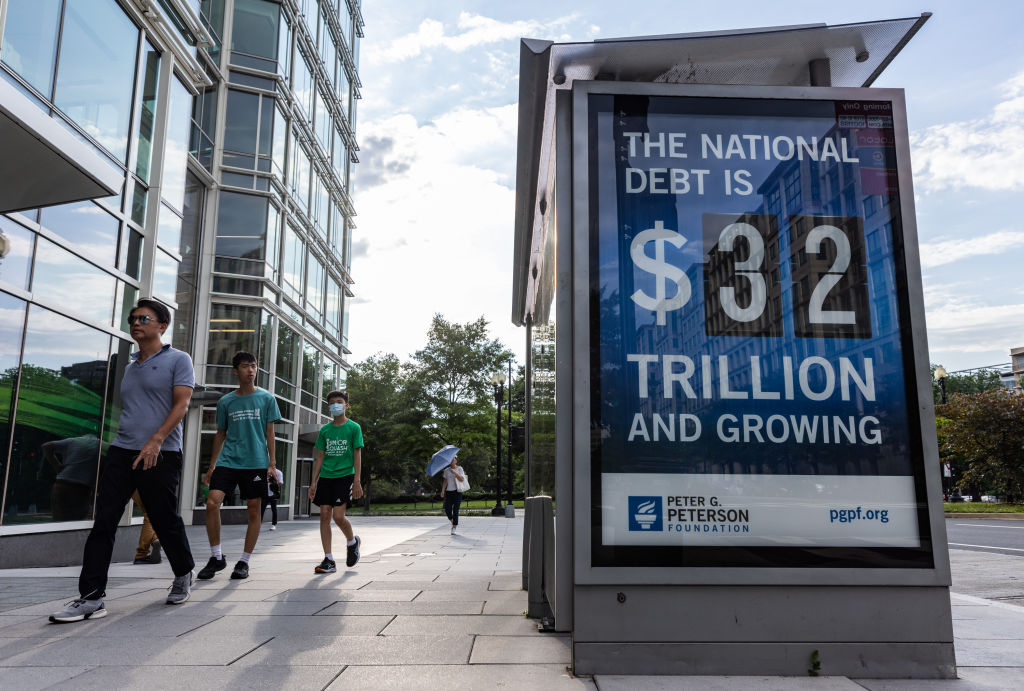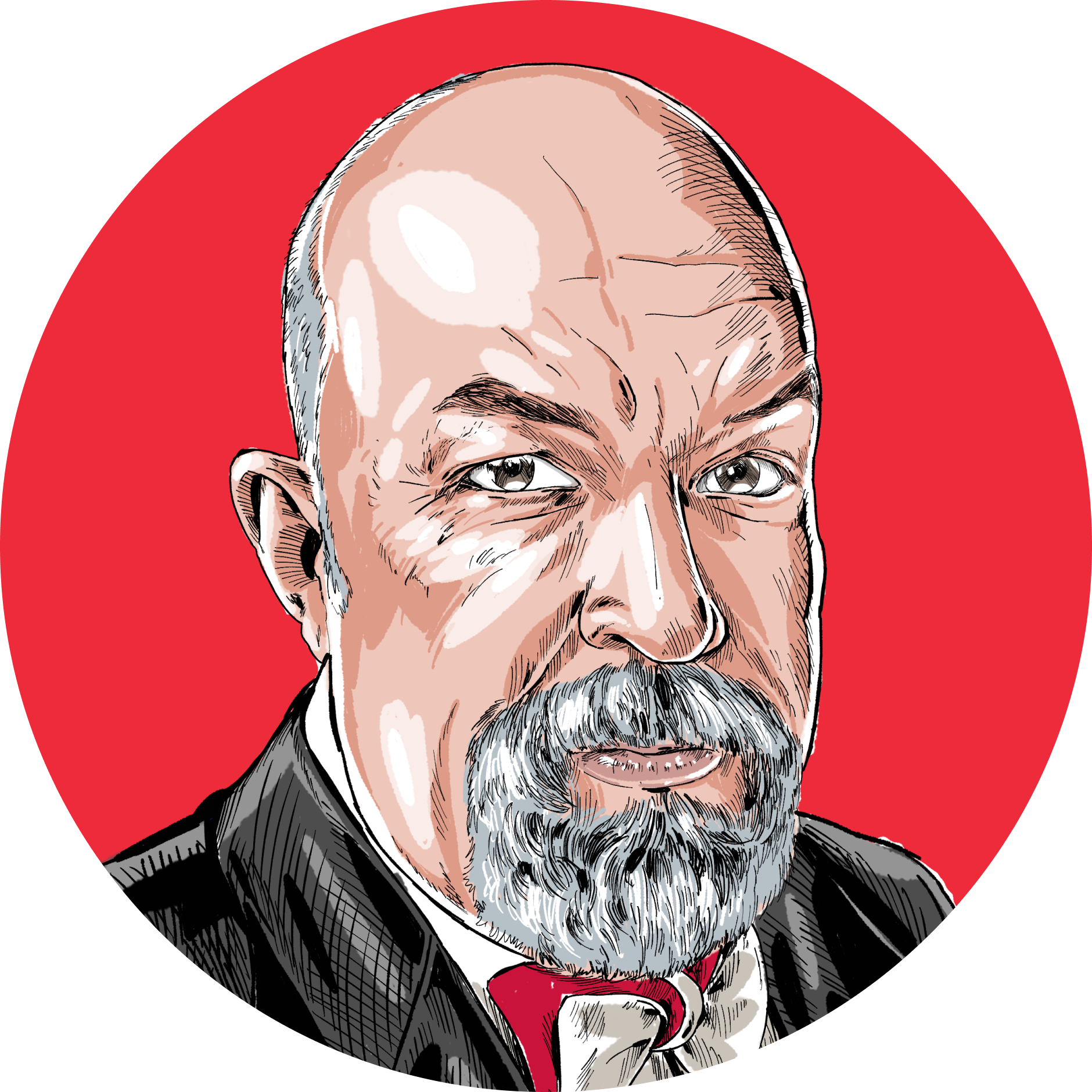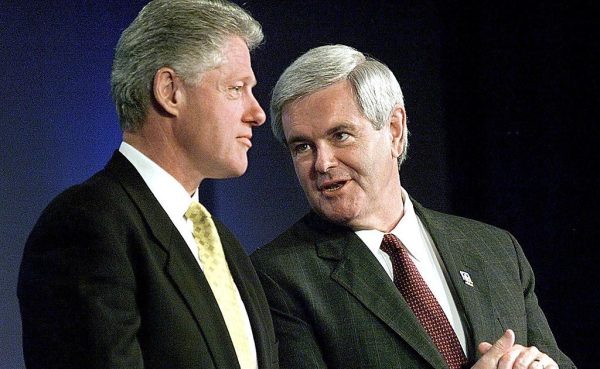As a wise man once observed, “When you look long into the abyss, the abyss looks into your credit rating.”
There is a style of political argument—a bad style—that goes like this: “The issue I care about the most involves an existential threat, so, in effect, my issue is the only issue that matters.” Some examples: It isn’t going to matter very much whether we fix trade policy if climate change kills us all. Nobody is going to be talking about banks’ capital requirements once the nuclear missiles start flying.
Sometimes, this style is deployed as a means of deflection: We don’t have time to talk about the Biden family’s corrupt influence-peddling racket when Donald Trump is preparing to inaugurate a police state. Every Republican presidential candidate of my lifetime has been labeled “the most radical” and “the most dangerous” candidate ever. That boy-who-cried-wolf stuff is part of the reason (not the only part) Trump is able to shake off so much legitimate criticism—illegitimate criticism and hysteria have inured some Republican partisans to such criticism in a genuine way, while cynical demagogues can get a lot of mileage out of saying, “Sure, that’s what they’re saying about Trump, but they also blamed Mitt Romney for a woman’s cancer death.”
On Mondays, Wednesday, and Fridays, George H.W. Bush was a “wimp,” while on Tuesdays, Thursdays, and Saturdays, he was a ruthless murderer, a war criminal who had strafed Japanese lifeboats as a pilot in World War II. (On Sundays, The McLaughlin Group debated whether he was a wimp or a ruthless murderer.) You should read the stuff they said about Dwight Eisenhower. The effectiveness of the existential-threat mode of argument is why every election—and, especially, every presidential election—gets talked about in Manichean terms. And it is why so many advocates insist that their issue is the Big One.
So, my big issue—the country’s precarious fiscal situation—isn’t the only issue. And it is an issue that can be misused and abused, too: A good deal of Republicans’ cowardly urge to abandon Ukraine to the ravages of a Russian caudillo many on the right quietly (or not so quietly) admire is cloaked in concern about federal spending. That’s another variation on the every-issue-is-really-my-issue mode of thinking: We wouldn’t be in such terrible fiscal shape if not for all those Mexican illegals signing up for welfare. When you hear that, you know that what haunts the speaker is not debt, but Mexicans.
We wouldn’t be in this pickle if only the rich would—all together now!—pay their fair share is a version of that, something usually said by people who don’t know much about how our tax system works but know a lot about envy and resentment. We could fix the schools if only we’d redirect the money we’re spending on all that woke stuff. I used to write a great deal about marijuana legalization, and the weed guys—who were basically right on the fundamental question—would tell you that legalizing weed would balance the budget, fix health care, and usher in an era of world peace. For the weed guys, as with a lot of other ideologues and activists, their issue is—[cue sound of giant bong rip]—the only issue, dude.
There’s a kind of paradox at the heart of our fiscal situation. The United States is a very, very rich country. As measured by GDP per capita, the United States enjoys a commanding position: There are a few countries ahead of the United States in the rankings, but they mostly are teeny-tiny little enclaves such as Monaco (37,000 residents and GDP about $235,000 per capita) and Liechtenstein (39,000 residents and GDP about $184,000 per capita) or countries with relatively small economies and GDPs swollen by corporate tax-accounting shenanigans (Ireland, Bermuda). Among what we might call (with apologies to our very comfortable friends in Monte Carlo) “real countries,” the only ones with GDP per capita exceeding that of the United States are relatively small and very capitalistic (Switzerland and Singapore) or petro-emirates (Qatar, Norway). The U.S. lead over the other major countries is remarkable: Germany is a perfectly fine country, a prosperous and well-governed one, but its GDP per capita is a third less than that of the United States. France’s GDP per capita is just a smidge over half the U.S. figure. And the United States has almost 340 million people.
Anybody who tells you that his favorite policy costs nothing, imposes no pain, and involves no trade-offs is a liar. That being stipulated, the United States does not want for material resources to throw at our problems. There is no eliminating scarcity, human being and their appetites being what they are, but if the United States does not have the material resources to solve a problem, then there is no solving the problem by means of material resources, at least under current economic realities. (My friend Jonah Goldberg is fond of James Burnham’s proverb: “Problems without solutions aren’t really problems.” They are instead, as Goldberg writes, only facts.) The United States has enough money to do the things it wants to do—all of the private-sector things as well as the public-sector ones, including maintaining the kind of military it wants to have, funding a more-than-adequate welfare state, subsidies for education and scientific research, etc. I’d disinvent the federal highways system if I could (sorry, Ike!), but we can afford to maintain that, too. Basically, a problem that can be solved with money is a problem the United States can solve—the kind of problem we want to have.
But no matter how much money you have, x is less than 1.5x. Our deficits and debt are mainly driven by entitlement spending, and our entitlement-spending model doesn’t work, because it is based on the mistaken notion that we can transfer to Peter more than we are willing to take from Paul—forever. You can fix that by cutting spending or by raising taxes (or, if you want to get really wild, by means of a sensible bipartisan compromise incorporating a bit of both), but it doesn’t matter how much tax revenue you collect if you are committed to spending 130 percent of whatever it is, as we did in 2022 and as we are more on less on track to do forever.
Until we can’t.
And now we get to the point where I have to guard against getting hysterical and overstating the case. So, here goes:
The fiscal problem isn’t our only problem. The challenge from China is a problem. Iran is a problem. The state of K-12 education is a problem. Our unsecured borders are a problem. Crime is a problem. The state of our roads, bridges, airports, etc., is a problem. And if you think those problems are hairy right now, imagine trying to solve them while also cutting federal spending by a third or more, essentially overnight and in the midst of a worldwide economic crisis, with tax revenue collapsing and unemployment skyrocketing—which is what you can probably expect if the United States eventually ends up in an Argentina-style fiscal crisis.
That is where the math suggests we are heading—eventually. Not tomorrow, not the day after tomorrow, but at some point. And these things have a way of sneaking up on you, because the global economy and the credit markets that serve it are incomprehensibly (literally incomprehensibly) complex, which is why so many smart people miss things like the 2007-2008 subprime meltdown or the 1997 Asian financial crisis or the 1994 collapse of the Mexican peso—or whatever the next big unexpected economic shock we are not currently expecting is going to be. You want to meet these crises with money in the bank rather than while hemorrhaging money for no good reason. Because, again, even though there will be trade-offs and hard choices, it’s not like we can’t afford to do the things that need to get done.
We just can’t afford … this.
Economics for English Majors
Present value is a slippery thing. Wimpy would gladly pay you Tuesday for a hamburger today, but you want your money now, in part because you have needs of your own to attend to before Tuesday, and in part because you don’t necessarily trust Wimpy to pay up when the time comes, because Wimpy is, famously, a deadbeat who cannot afford a hamburger today.
(Ask anybody who has been in business with Donald Trump what that feels like.)
Present value is a way of talking about how strongly you prefer to get paid for that hamburger today rather than on Tuesday. Usually, it involves discounting the price of an asset such as a bond, selling it for a little bit (or a lot) less than its notional value so that you can get paid today instead of in 20 years when the bond matures.
Getting paid today rather than in the future, or over time, is vastly preferable to many people in many situations. One good example is the case of lottery winners: If you win a $1 billion Powerball jackpot, you do, indeed, win $1 billion—paid out over 29 years in the form of an annuity. But if you want the whole pile of money right now, you’ll take a pretty big haircut. In fact, the haircut has been getting bigger in recent years because of higher interest rates: The math is a little bit more complicated, but, basically, when you win a Powerball jackpot, you get a choice between the 29-year annuity and a lump of cash that would be big enough to buy you that 29-year annuity today; with higher interest rates, you can get the same annuity for a little bit less money, hence the lower cash options.
If you are trying to figure this out as a matter of corporate financial accounting, then there are some pretty hard-and-fast rules that apply. But, as with most things in economics, the issue is at heart a psychological one, meaning a question of preferences that may be idiosyncratic. If somebody offered you Shohei Ohtani’s $700 million Dodgers contract, you’d probably want a big chunk of that money up front. But Ohtani has famously decided to defer 97 percent of it until the end of the 10-year contract period, taking only $2 million a year for the next 10 seasons. (“Only.”) Ohtani can afford to put off getting paid because he already is making something on the order of $50 million a year in endorsements and such, so the marginal value of another $50 million a year or whatever is relatively low for him. He also has an economic strategy: By making that money available for his team to acquire and retain high-level players, he hopes to build up the Dodgers’ overall business, thereby increasing his own present and future income on the endorsement side and on the team side, too: If the Dodgers should win a World Series or two, they’ll have a lot more money to do things for Ohtani.
So, the present value of future income can be more or less than the on-paper value of the income itself, and that depends on lots of variables ranging from interest rates to individual considerations. Most of us would be better off if we could get all the money we’re going to earn in the future in a big pile today, because we could invest it in such a way that the total over time would be more than it would have been otherwise. Depending on the return we expect on our investments, that would still be true even if we paid a small penalty (say, 3 percent) for taking the money today rather than over the course of our working lives. Or we might decide, as Ohtani has, that it suits our interests more to get paid at some future date—even if you don’t have a baseball team to carry on your shoulders, it might make sense to defer some income until later in life for tax reasons or other considerations.
In that sense, figuring out present value involves more than math. But that’s part of why economics is a field distinct from mathematics.
Words About Words
Forgive me for continuing to inflict Salon headlines on you, but consider this one: “It may seem nonsensical to say that calls for genocide are protected speech but colleges are in a tough spot.”
Of course calls for genocide are protected speech under the First Amendment, which exists for the sole purpose of protecting speech (especially political speech) that people find objectionable. The idea that this would be nonsensical—something that sense cannot be made out of—is itself nonsense. Nonsensical means meaningless or, in a more expansive way, impractical or unworkable. It is one of those words that sloppy writers and speakers deploy as though it were a magic word, discrediting in and of itself. (Racist and hateful are used in a similar way, along with extreme, radical, etc.) It is a way of not dealing with the argument in front of you.
My friend David French and others make a persuasive case that U.S. universities would do well to follow the lead of the University of Chicago and adopt a First Amendment approach to speech: institutional neutrality as to the content of speech, with any time-and-place restrictions (no bullhorns outside of a residence at 2 a.m., for example) enforced in a content-neutral and even-handed way. That seems to me like the right thing to do.
You can say that is wrong, but you cannot say it is nonsensical.
Elsewhere
A thing I keep writing: “Remember, you asked for this.”
Presidential elections are almost always showy, nationalistic affairs, full of appeals to patriotism and unity, occasions upon which even Ivy League diversity officers wave the flag and festoon the public square in red, white, and blue. And that points to the tension at the heart of the dreadful and contemptible 2024 presidential election, which almost certainly will be fought out by Donald Trump, a depraved game-show host who tried to stage a coup d’état when he lost his 2020 re-election bid, and Joe Biden, a plagiarist and fabulist first elected to public office 53 years ago who is going to be spending a lot of time this campaign season thinking about his family’s influence-peddling business and the tricky questions related to it, like whether you can deduct hookers as a business expense.
Run Old Glory up the highest flagpole you can find, but 2024 is going to be the least patriotism-inspiring election in American history so far, a reminder of what a depraved, decadent, backward, low-minded, primitive, superstitious and morally corrupt people we have become.
Don’t blame “the system,” you gormless weasels. You chose this.
Radio is always subject to change, but you can probably catch me with Michael Smerconish on SiriusXM around 10 a.m. Eastern today.
You can buy my most recent book, Big White Ghetto, here.
You can buy my other books here.
You can see my New York Post columns here.
Please subscribe to The Dispatch if you haven’t.
You can check out “How the World Works,” a series of conversations about jobs and work I’m doing for the Competitive Enterprise Institute, here. I particularly enjoyed my recent conversation with Klon Kitchen. Check it out.
Speaking of CEI, you can read the monograph I wrote with them, Inside the Carbon Cult, here.
In Closing
At some point, we’re going to have to develop some kind of standard when it comes to pseudo-science and superstition. I enjoyed this New York Times piece about Mexican-American folk healers, but I couldn’t help thinking that the tone would be very, very different if this were an evangelical prayer group or if there were ivermectin involved. The science behind chiropractic is the same as the science behind so-called Intelligent Design—there is none, these being two different kinds of hokum—and it is jarring to see people who have their doubts about evolution being lectured to by columnists in newspapers that publish horoscopes.









Please note that we at The Dispatch hold ourselves, our work, and our commenters to a higher standard than other places on the internet. We welcome comments that foster genuine debate or discussion—including comments critical of us or our work—but responses that include ad hominem attacks on fellow Dispatch members or are intended to stoke fear and anger may be moderated.
You are currently using a limited time guest pass and do not have access to commenting. Consider subscribing to join the conversation.
With your membership, you only have the ability to comment on The Morning Dispatch articles. Consider upgrading to join the conversation everywhere.